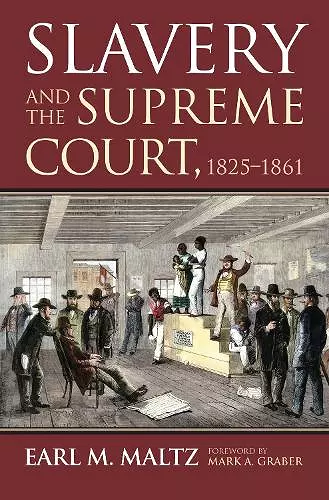Slavery and the Supreme Court, 1825-1861
Format:Hardback
Publisher:University Press of Kansas
Published:3rd Nov '09
Currently unavailable, our supplier has not provided us a restock date

During America's turbulent antebellum era, the Supreme Court decided important cases - most famously Dred Scott - that spoke to sectional concerns and shaped the nation's response to the slavery question. Much scholarship has been devoted to individual cases and to the Taney Court, but this is the first comprehensive examination of the major slavery cases that came before the Court between 1825 and 1861. Earl Maltz presents a detailed analysis of all eight cases and explains how each fit into the slavery politics of its time, beginning with The Antelope, heard by the John Marshall Court, and continuing with the seven other cases taken before the Roger Taney Court: The Amistad, Groves v. Slaughter, Prigg v. Pennsylvania, Strader v. Graham, Dred Scott v. Sandford, Ableman v. Booth, and Kentucky v. Denison. Case by case, Maltz identifies the political and legal forces that shaped each of the judicial outcomes while clarifying the evolution of the Court's slavery-related jurisprudence. He reveals the beliefs of each justice about the morality of slavery and the judicial role in constitutional cases to show how their actions were determined by a complex interaction of political and doctrinal considerations. Thus he offers a more nuanced understanding of the antebellum federal judiciary, showing how the decision in Prigg hinged on views about federalism as well as attitudes toward human freedom, while the question of which slaves were freed in The Antelope depended more on complex fact-finding than on a condemnation of the slave trade. Maltz also challenges the view that the Taney Court simply mirrored Southern interests and argues that, despite Dred Scott, the overall record of the Court was not particularly proslavery. Although the progression of the Court's decisions reflects a change in the tenor of the conflict over slavery, the aftermath of those decisions illustrates the limits of the Court's ability to change the dynamic that governed political struggles over such divisive issues. As the first accessible account of all of these cases, ""Slavery and the Supreme Court, 1825-1861"" underscores the Court's limited capability to resolve the intractable political conflicts that sharply divided our nation during this period.
This is legal history as it should be: dispassionate, doctrinally sophisticated, and deeply rooted in political context. It will become the standard against which are measured all other studies of the High Court's slavery cases. Peter Charles Hoffer, coauthor of The Supreme Court: An Essential History ""Maltz sensitively combines legal analysis with attention to the political environment in which the Court operated. Everyone interested in antebellum law and politics will profit from his work."" Mark Tushnet, author of Slave Law in the American South ""A concise, understandable, and insightful overview."" Michael Les Benedict, author of The Blessings of History: A Concise History of the Constitution of the United States
ISBN: 9780700616664
Dimensions: 238mm x 165mm x 33mm
Weight: 739g
344 pages